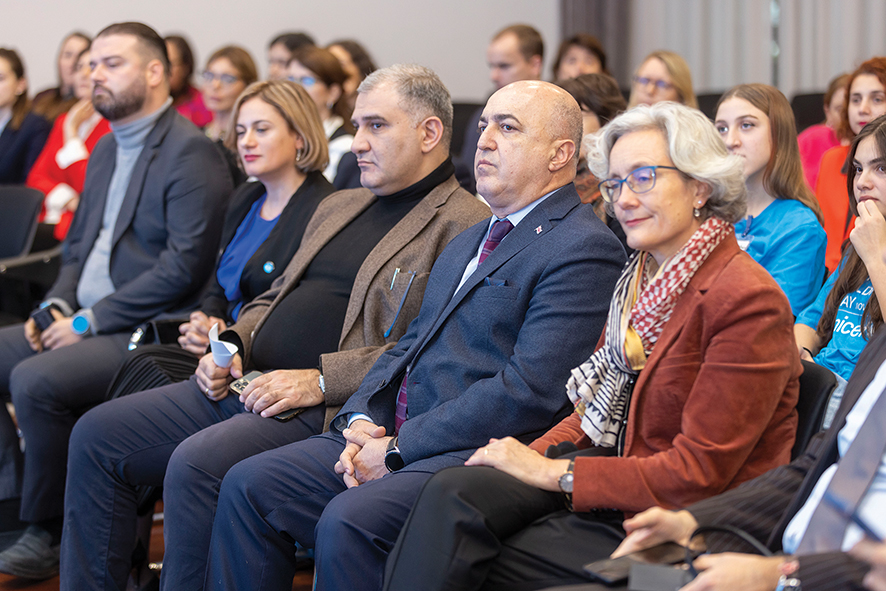Georgia celebrated its 30th anniversary with The United Nations Children’s Fund (UNICEF) on Monday by commemorating World Children’s Day and discussing the progress the country has made over the last three decades.
In 1989, the UN General Assembly adopted the Convention on the Rights of the Child (CRC), which is a global set of legally binding laws to protect children’s well-being. Georgia opened its UNICEF office in 1993, when the goals shifted from humanitarian assistance to rehabilitation and development, and, in 1994, they joined the CRC. During the celebration, participants emphasized the importance of accelerating the CRC, building an inclusive society for everyone, recognizing how far children in Georgia have come, and recognizing what still needs to be overcome.
“As we look back, we can celebrate, but there are still too many challenges that kids endure,” said Sabine Machl, UN Resident Coordinator.
Jesper Moller took over as the UNICEF Representative for Georgia five months ago. He has worked with UNICEF for 22 years, however, in his position in Georgia, he focuses primarily on upstream work, which is composed of policy, legislative reform, influencing, and working with the government so they can fulfill their commitments. When summarizing the country’s results over the past few years, he highlighted specific areas that have had major developments.
According to Moller, many achievements have been made in health, especially in the field of vaccines. The availability of research, updating immunization schedules, and consistently updating new vaccines have increased allowing more children to avoid contracting diseases. It was also noted that the mortality rate has dropped more than 50% in the past three decades.
Moller says Children’s access to education and psychologists has also made significant progress thanks to UNICEF. Due to development in Georgia’s national legislative framework, technical support, and advocacy of education issues, the percentage of children that now have access to preschool education rose from 46% in 2011 to 72% in 2022. Another way the education system is being reformed is by students who are chosen to act in the roles of their higher-ups, such as nurses, teachers, and administrators, to give feedback as to how the school system can do better.
“The more roles young people themselves have in decision-making support, the more sustainably we are looking at solutions,” said Moller.
After the country’s progress was summarized, two people were designated as National Ambassadors of UNICEF Georgia. They were awarded in person with plaques, for their verbal declaration of their commitment to being a voice for children across Georgia through personal platforms. Moller says that advocacy and communication about these topics concerning children are very important, and this is one way to spread awareness.

The first person was Irma Khetsuriani, a para-athlete wheelchair fencer who will be representing Georgia in the Olympics next year. This is her first time working with UNICEF, and she showed a strong willingness to advocate for children’s rights. The second person was Nikoloz Rachveli, a conductor and composer who has cooperated with UNICEF for a long time but has “renewed” his commitment to children in Georgia and the work being done to help them.
“Indeed, it’s an important day for UNICEF Georgia, but also an important day globally,” said Moller.
Monday night was a special event to commemorate what has been accomplished over the last 30 years. However, Moller said Georgia is on a five-year cycle, where every five years a strategic program of cooperation with the Government of Georgia is presented to the executive board of UNICEF, which is comprised of UN member states. Once the new proposed program is approved by the board, those actions are implemented within the government; currently, Georgia has two more years before it enters a new cycle.
When looking forward to what still needs to be accomplished, the education sector is always a top priority. Moller says reform in both primary and secondary education is still needed, plus the need to position the teacher profession more strongly. Another aspect is mental health, not only in children but in young adults – Moller wants to engage more actively with people in this field, but that would require additional reforms to meet their needs.
Moller said another aspect moving forward is to further develop the social work profession to ensure children, regardless of where they live, have access to services.
“We will continue to operationalize the code on child rights, which is a very important foundation for advancing social service delivery for children into the municipalities,” said Moller. “So we want to see more reform with municipalities to make sure the municipalities are equipped with the right finances and resources to deliver basic social services.”
Other topics that were highlighted at the event included: The Early Learning and Development Concept; a better inclusive general education, with the introduction of digital resources and international practices; child poverty (decreased from 37.7% in 2004 to 20.4% in 2022), prevention of family separation by moving children from large scale institutions to family-based care; and the decline in violence against children.
World Children’s Day is celebrated each year on November 20, the same day the CRC was adopted in 1989. The day serves as an opportunity to spread awareness and raise funds for children all around the world to put them on a path to a better future.
“Children are the heart of society and the indication of a country’s progress,” said Machl.
By Shelbi Ankiewicz














